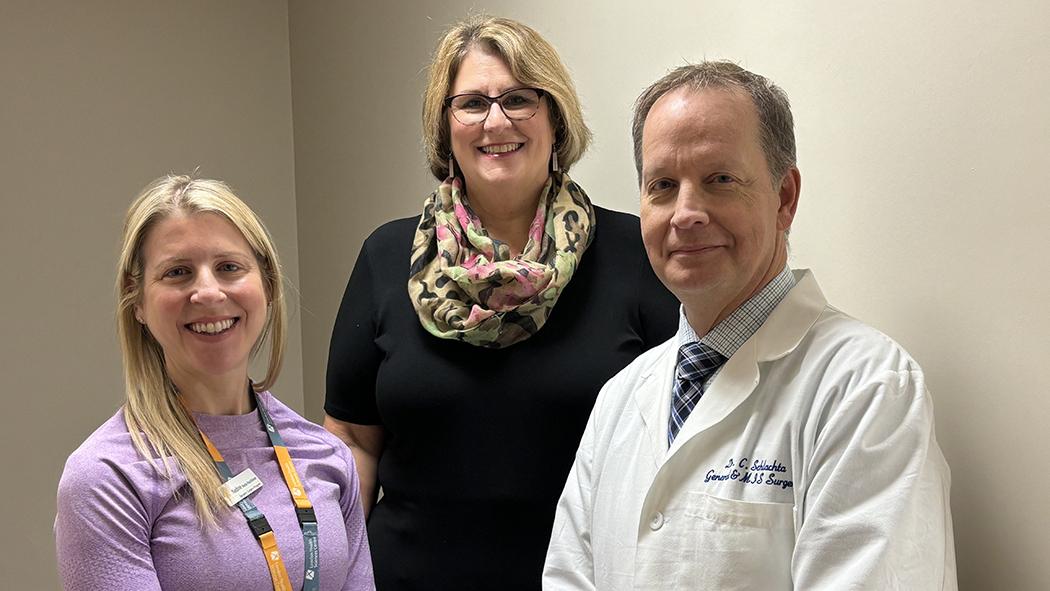
December 14, 2023
Jane Shewfelt has no more limits.
She enjoys life, bikes, kayaks, does fitness classes, and loves spending time with her three granddaughters.
“It’s not perfect, but nothing stops me now,” says the 58-year-old retired educator.
It was 15 months ago on an operating room table at London Health Sciences Centre’s University Hospital that Jane’s world started to change.
Since then, she has lost a lot but gained so much more. After undergoing bariatric surgery, Jane has lost 37 per cent of her body weight and gained a full and active life.
Decades of yo-yo dieting took a toll on her health. Heart issues, three medications for high blood pressure, a fatty liver, acid reflux medication, cortisone injections for osteoarthritis in her knee and discussions about a knee replacement.
Since the surgery, “I’m off all my blood pressure medications, my acid reflux meds, my liver is normal and I haven't had a cortisone injection in my knee since because I'm walking without pain now,” she says.
University Hospital is home to the London Bariatric Centre of Excellence, one of only 10 such centres in the province that are part of the Ontario Bariatric Network (OBN). The network was established in 2009 to help make treatment for those with obesity more accessible and reduce the need to travel out of province for this life-changing surgery. The OBN is a collaborative network consisting of interdisciplinary teams of bariatric experts that provide comprehensive medical and surgical bariatric services.
Dr. Christopher Schlachta, the centre’s medical director, says that more than 1000 surgeries have now been completed at the centre since it opened in January 2018.
While bariatric surgery is not a magic bullet, Dr. Schlachta says, it is “incredibly simplistic” to think that obesity can be cured by just eating less and exercising more.
“Obesity is an illness and it is not the patient’s fault,” he says. “The level of discrimination, judgment, lack of opportunities for advancement and scorn people who suffer from obesity face on a daily basis is staggering.”
For those who do opt for surgery, it is not as simple as just the operation. There are months of preparation appointments, including meetings with a social worker, dietitian, nurse, nurse practitioner, psychologist, and various other medical specialists, explains Nadine Shaban, the lead nurse practitioner with the program who works with patients before and after surgery.
“It takes about six months after you are accepted into the program to make it to surgery and then there are check ups one, three and six months after as well as at one year out,” she says. This is part of the specialized care that all patients receive when they are a patient of the bariatric centre of excellence.
The OBN has minimum body mass index requirements before a doctor can refer a patient to the network but once accepted, the patient is then connected with one of the centres of excellence based on where they live in the province. Since 2018 when the LHSC centre opened, the program has expanded from performing less than 100 surgeries in a year to being on track for 230 surgeries this year and continuing to grow.
Jane underwent a gastric bypass which involves creating a small pouch from the stomach and connecting it directly to the small intestine.
For those who undergo this type of surgery, the actual operation is only the beginning, says Dr. Schlachta. “It requires a commitment to lifestyle change, including changing your dietary habits, changing your activity and exercise routine, and having sufficient social supports, and that, in addition to surgery, actually leads to the greatest long-term sustained weight loss.”
The programs specialized team goes above and beyond providing surgical care, and comprehensively supports their patients at each step of the way on their journey.
Dr. Schlachta explains that increasing obesity rates in society are not just in North America. It’s a global phenomenon. The World Health Organization (WHO) has declared obesity as an epidemic due to the significant impacts in many aspects of a patient’s health and wellness.
According to the WHO, more than four million people a year die as a result of being overweight or obese. LHSC plans to continue to expand its program to meet the needs in the region and beyond.
Jane is just happy to have energy and be pain free. She’s very grateful for the care she received from the team at University Hospital. “They were all exemplary.”
And she too sees obesity as an illness. “I think treating obesity as an illness allows us to be more successful than if we don’t. There are lots of strategies to address obesity, but unless we actually name it, we’ll never actually fix it.”